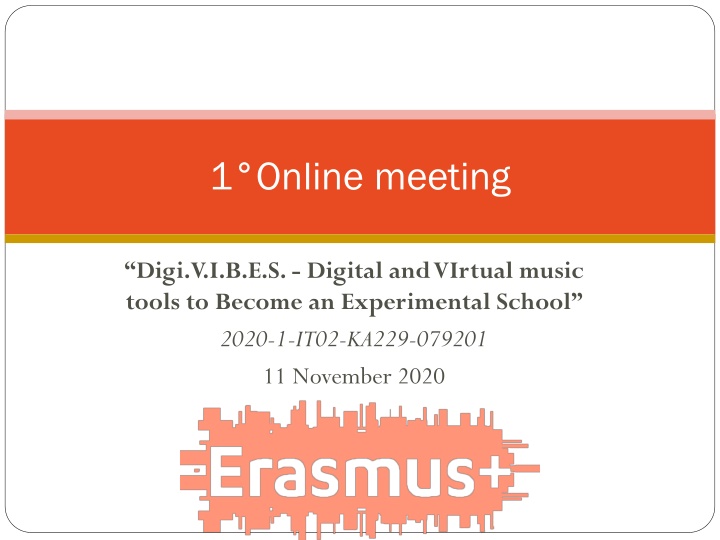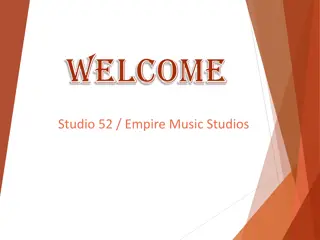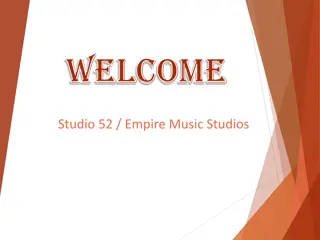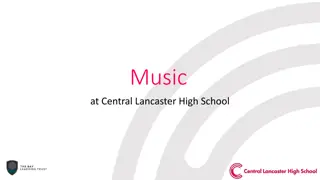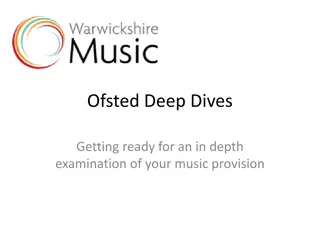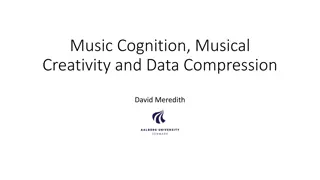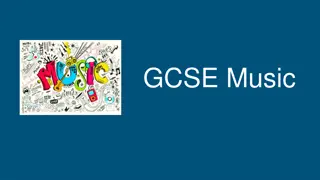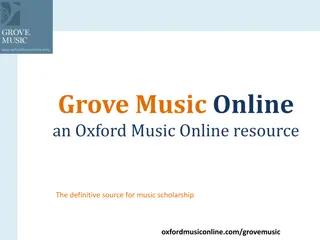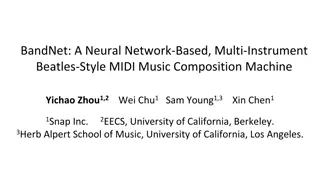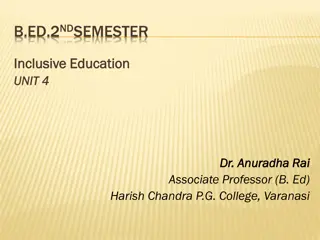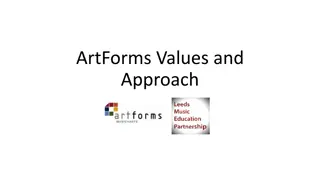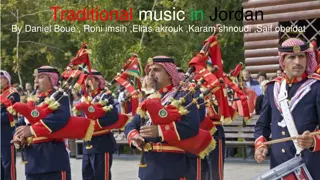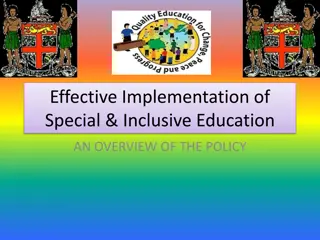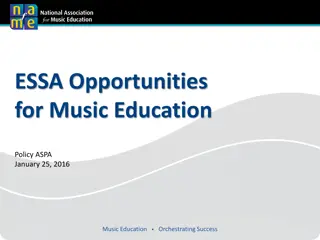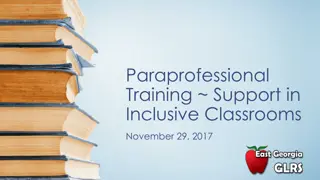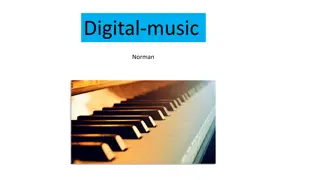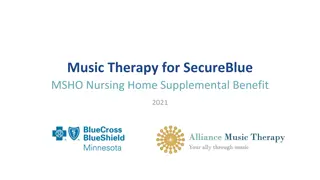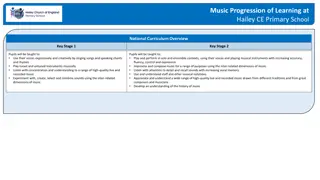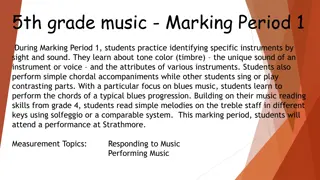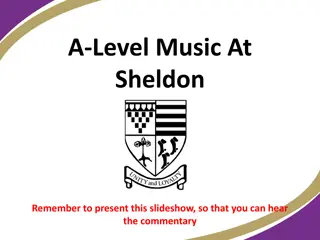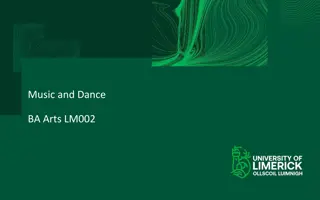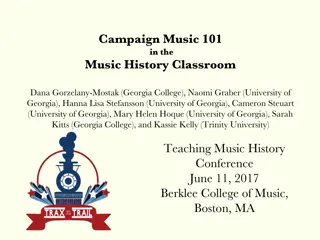Digital Music Education for Inclusive Learning
This project focuses on digitizing music lessons to promote inclusion among students with an interdisciplinary approach. By leveraging digital tools and innovative teaching methodologies, it aims to enhance students' learning styles, skills, and motivation in music education. Through international collaboration and continuous training for teachers, the project seeks to address social challenges and develop innovative teaching methods in music education. The concrete results will be the "DigiVIBES Toolkit," a collection of good practices for digital, interdisciplinary, and inclusive learning units.
Download Presentation

Please find below an Image/Link to download the presentation.
The content on the website is provided AS IS for your information and personal use only. It may not be sold, licensed, or shared on other websites without obtaining consent from the author.If you encounter any issues during the download, it is possible that the publisher has removed the file from their server.
You are allowed to download the files provided on this website for personal or commercial use, subject to the condition that they are used lawfully. All files are the property of their respective owners.
The content on the website is provided AS IS for your information and personal use only. It may not be sold, licensed, or shared on other websites without obtaining consent from the author.
E N D
Presentation Transcript
1Online meeting Digi.V.I.B.E.S. - Digital and VIrtual music tools to Become an Experimental School 2020-1-IT02-KA229-079201 11 November 2020
Overall presentation of project activities Basic info: Focus on digitalization of music lesson to raise awareness to the topic and foster inclusion among students with an interdisciplinary approach. 3 main features: Digitization and innovation of educational systems, through a massive use of softwares, tools and mobile Apps for learning Inclusion of pupils with special educational needs, foreseeing their participation in mobility and adapting the didactic modules developed to all Empowerment of teachers' skills with continuous professional growth thanks to the international comparison during the Project
Overall presentation of project activities General objectives are to: Achieve a significant impact on pupils' learning styles, stimulating interest and motivation thanks to the inclusion of ICT in the teaching of music education Contribute to the development of key, transversal and life skills of pupils through the innovation of teaching methodologies and renewed approaches to teaching music disciplines in an interdisciplinary way and with a massive use of ICT Adapt the skills and methodological tools available to teachers to respond more effectively to social challenges, supporting them through continous training and European comparison in the development of innovative teaching and assessment methods in music education
Overall presentation of project activities Specific objectives are to: To experiment the implementation of specific software and digital technologies for music education, alongside the multimedia textbook, aimed at enhancing teaching strategies and, consequently, triggering positive effects on learning. Develop innovative teaching materials that include: Interdisciplinary connections, through the involvement of teachers of musical disciplines but also artistic-literary and mathematical-scientific ones in the elaboration and experimentation phase of DigiVIBES The use of digital tools, software and mobile applications for learning music and acquiring key skills An inclusive approach, which provides for the adaptability of teaching items to all learning styles and different skills to be tested on international pilot classes, which will also include children with SEN, during international mobility.
Overall presentation of project activities The concrete results elaborated at the end of the project will be: "DigiVIBESToolkit", a compendium of good practices where the digital, interdisciplinary and inclusive learning units submitted to students during mobility and tested in international classrooms will be collated, which will cover 6 different musical styles in European history: Classical, Folk, Rock, Jazz, Electronic and Musical Music.
Overall presentation of project activities Activities: Preparation phase (until 30th December 2020): Organizing C1 the proposal is to have the 1 Joint staff event online, so that we can kick off the project and progress with it. We should try to do it as it were in person, so all countries organize a training session of max 1 hour about a best practice on music, digital tools and inclusion. Moreover, we will lead some sections about main project elements (i.e. ow to structure a learning module). Students selection: 20 students per country (10% of the students will have to be Special needs students) Teachers involvement: 6 teachers per country directly involved Implementation of the Twinspace, partners websites and social network pages Creation of the Erasmus Corner in each school Vote on the project logo Kick off the project on the press
Overall presentation of project activities Implementation phase (from Dec 2020 to June 2021). 6 Short term students mobilities, 4 students and 2 teachers each (see dates in the relevant slides), 4 working days + 2 travel days each 2 Joint staff training events, 3 teachers for C1 and 2 teachers for C8 (Italy November 2020; Netherlands May 2022 final dates to be confirmed at the start of the upcoming school year) During the time inbetween each mobility, the teachers in international teams will have to collaborate to create 3 cross-curricular didactic modules on the topic of the mobility (Musical, Classic music, Rock music, Electronic music, Folk music, Jazz music). During the mobility, the modules will be tested in an international environment. Will be also organized the Audiction sections (like X-factor) in which students, in team, will have to challenge other groups which will help to develop interpersonal skills. 1 output to be produced: DigiVIBESToolkit, compendium of good practices where the digital, interdisciplinary and inclusive learning units submitted to students during mobility and tested in international classrooms will be collated, which will cover 6 different musical styles in European history.
Overall presentation of project activities Activities: Evaluation/Dissemination phase (June-August 2022): Internal dissemination (other students, teachers, families) External dissemination: involvment of stakeholders and public authorities, Twinspace, Erasmus Corner, social media, partners websites Europass documents (Mobility, Language Passport) Assessment questionnaire at the end of every activity aimed at measuring the impact on participants and organizations Each of the 20 students being part of the DigiVIBES team will be assessed through a student portofolio, which will allow to measure the attitude during mobilities and in the classroom, the interaction with the group, the interest shown, the skills, the role in situations of conflict / problems, hard and solf skills self-assessment questionnaire and peer evaluation satisfaction questionnaire administered to students and their families
Distribution of tasks The Italian school, as leader, will guarantee the correct management and precise and punctual implementation of the activities, prepare the reporting and monitoring system, host C1 and the last mobility with the students, leading on the Music genre Jazz music which will be the topic of the C7 mobility. This also includes preparatory activities. Bulgaria: prepares and organizes C3, which will rotate within the theme of " Classical music", with preparation activities on Twinspace. Bulgaria will also help the coordinator with the management tasks. Turkey: will take care of the logo contest and social communication, as well as hosting C6, with the theme " Folk music", with related preparation activities.
Distribution of tasks France: will be responsible for the TwinSpace creation, where students will realize virtual mobility and prepares and organizes C4 on the music genre Rock music" with related preparation activities The Netherlands: will host C2, focused Musical , with related preparation activities. They will also be responsible of the Website creation and the organization of the last mobility for teachers C8. Malta: will leading the process to create the modules, merging and organizing the material related to the final DigiVIBESToolkit (project output) and prepares and organizes C5 on the music genre Electronic music" with related preparation activities.
Preparation phase (from 1st Oct to 30th Dec): Implementation of the TwinSpace: France The Twinspace should have, from the start, at least the following pages: Description of the project (rationale, objectives, activities) Description of the partners Page for the logo vote each student selected has to be provided with an account for voting and virtual mobility Deadline: ... December 2020 Deadline for sending school description in English to France: 30 November Vote on the logo: Turkey Vote day: 18 December 2020
Preparation phase (from 1st Sept to 30th Dec): Vote on project logo rules: Each country has to send 2 logos made by students Both digital and handmade logos are accepted. The acronym of the project and either the EU flag either the partner countries flags will have to be included as minimum elements in the logos. Each country can express 20 votes (20 students or students + teachers if selection has not been expired yes) 100 votes on 10 logos Voting platform will be Twinspace and a Google Form so that votes are automatically registered and processed to avoid getting crazy with calculating the results Each country can vote for the favourite logo EXCEPT the two for their own country 1 person = 1 vote Deadline for sending logos: 16th December to the Turkish partner (TO BE RESPECTED!) Logo vote day: 18th December
Preparation phase (from 1st Sept to 30th Dec): Creation of the Facebook page: Turkey Deadline for FB page creation: November Creation of the YouTube profile: Turkey Deadline for TW profile creation: __________
Preparation phase (from 1st Sept to 30th Dec): Involvment of stakeholders This is a crucial point for our project, for disseminating the results Stakeholders are: Local/Regional/National Public Bodies Other schools both private and public Professionals and thematic networks: look which network is active in your town, they will be very useful!
Students selection criteria Students selection criteria: Age of students between 11 and 13 years 20 students creating the DigiVIBESTeam, each one taking part in one mobility but all involved in the activities foreseen all along the two years (i.e. virtual mobilities, dissemination). Each school may have additional criteria All partner schools will involve at least 10% of students (2) with special educational needs/fewer opportunities. After selection expired each partner will enroll its own students and teachers into the Twinspace (name, surnames and profile pics). Deadline for selecting students: 10th December
Preparation phase (from 1st Sept to 30th Dec): Once the 20 students will have been selected, before the mobility in Netherlands, the 3 Modules on Musical: digital, inclusive and cross-curricular will have to be created. The Dutch team will lead the process, but all partners (and their students) will contribute via eTwinning (virtual mobility, preliminary to the physical one). We have to define a template for the modules, so that every country will follow the same structure. Structure of the DigiVIBESToolkit will have to be structured as well. Let s define some chapters!
Modules model The international team decides that: The modules must be created with a participatory involvement of the students. The discussion and choice of final contents of the modules are the core part of the preparation phase. This will boost students interaction and motivate them to be engaged. All students registered in the project Twinspace can take part, not only those taking part into the mobility. When choosing, students can select 3 out of 6 musical composition which will be developed and later on included in the modules. Each module will be composed by 6 different music genre which are the one selected during the project writing of which each partner has one assigned: Classic music, Jazz, Rock, Electronic, Musical, Folk and the modules will have to cover the following topics: compositions to be developed, researches, authors, history and a tip and tricks section. Of course will have to be clarified which ICT elements have been used. We set a min and max length of the modules: min 1 max 2 pages per Music genre, so min 5 max 10 pages per topic, thus the whole document will be composed of min 25 max 50 pages, images, videos and hyperlinks included.
Tools for communication among coordinators Email for general coordination Twinspace All materials can be seen and downloaded from TS WhatsApp group For communication during the mobilities (at least coordinators and participating teachers have to be connected to the Internet when abroad for fast communication). PLEASE use it wisely! If we send randomly message we risk to lose important steps. For important and official communications, emails will be used only!
Tools for virtual mobilities and communication among students During the preparation of mobilities we will organize online meetings among students to discuss about the modules. The leading country of the Music genre will also lead the virtual mobility. We will use Twinspace: All students have to be provided with a TwinSpace account Students will useTwinSpace for: 1. chatting on the Twinspace Forum (asynchronic communication) 2. videoconferences (here we will have to schedule a day and a time when students can all be online. If not possible to set a common day for all 6 countries, we can make subgroups)
Implementation phase (Dec 2019 June 2021) 6 Short term students mobilities, 4 students and 2 teachers each (Netherlands January 2021; Bulgaria March 2021; France May 2021; Malta October 2021; Turkey January 2022; Italy March 2022, 4 working days + 2 travel days each 2 Joint staff training events, 3 teachers for C1 and 2 teachers for C8 (Italy November 2019; Netherlands May 2022) During the time inbetween each mobility, the modules to be tested will have to be developed by the DigiVIBES team. The hosting country will lead the process, but all partners will colaborate involving the 4 students taking part in the exchange. ICT elements has to be incorporated to enhance the experience through ICT. During the mobility, the jam session and the Audition will be implemented. 1 output to be produced: DigiVIBESToolkit, a collection of the 6 Music genre with its modules tested.
Scheduling mobilities General rules for mobilities events: 4 students, 2 teachers per country, working in English and in international groups Hosting country has to: Finding hosting families for the students give advice/ organize accommodation + lunches and suppers for teachers give advice/organize transports from the airport to the final destination organize local transports and logistics in general Support Italian coordinator in preparing a set of competences to be included in the Europass Mobility document for all participants.
Scheduling mobilities General rules for mobilities: The hosting country sends the schedule taking into account the daily flat rate given by the EU 53 per day per student + 106 per teacher x 4+2 days. Organization being under the responsability on the hosting country, each visiting country will pay for its share of expenses autonomously. Each country, according to national accountancy rules, can decide to pay for hotel and services (whenever possible) by bank transfer in advance or with cash/credit card once arrived.Hosting country has to be informed of the favourite payment method. We decided that all actual costs of the visits (i.e. trasports during activities, museus tickets etc) will be split among all participants. If hosting countries need to hire external experts or buy non consumable goods,this kind of expenses will be paid with the PM budget of the hosting country. Visiting countries are obliged to inform their hosting partner about possible food allergies and other specific needs concerning accommodation, the necessity to take medication and other significant issues All participants understand and accept the possibility of their image or photo being used for the purpose of promotion and dissemination of the project activities very important point!
Scheduling mobilities All mobilities will be scheduled taking into account partners needs so that every country can part in mobilities. The C2 in The Netherlands in January 2021. Date set: Travelling day Working days Travelling day The C3 in Bulgaria in March 2021. Date set: Travelling day Working days Travelling day
Scheduling mobilities The C4 in France in May 2021. Date set: Travelling day Working days Traveling day The C5 in Malta in October 2021. Date set: Travelling day Working days Traveling day
Scheduling mobilities The C6 in Turkey in January 2022. Date set: Travelling day Working days Traveling day The C7 in Italy in March 2022. Date set: Travelling day Working days Travelling day The C8 in The Netherlands in May 2022 JSTE (3 working days) Date set: Travelling day Working days Travelling day These dates will be confirmed on October 2021.
Students mobilities C2 The Netherlands From November 2020 to 16th December 2020 Virtual preparation for C2 Topic: Musical preparation to build up the modules": 3 music session 5 music track per team During the preparation, organized and lead by the hosting partner, the students will start researching/exchanging opinions on Twinspace. Use of eTwinning for preparation (virtual mobility) will be under the responsibility of the hosting partner and evaluation (final questionnaire, under the responsibility of the Bulgarian team) During the mobility, after having tested the modules and done the jam session they will take part at the final challenge with a final show putting in practice what learned during the mobility. Leader: The Netherlands
Students mobilities C3 Bulgaria From February to March 2021 Virtual preparation for C3 Topic: Classic music preparation to build up the modules": 3 music session 5 music track per team During the preparation, organized and lead by the hosting partner, the students will start researching/exchanging opinions on Twinspace. Use of eTwinning for preparation (virtual mobility) will be under the responsibility of the hosting partner and evaluation (final questionnaire, under the responsibility of the Bulgarian team) During the mobility, after having tested the modules and done the jam session they will take part at the final challenge with a final show putting in practice what learned during the mobility. Leader: Bulgaria
Students mobilities C4 France From April to May 2021 Virtual preparation for C4 Topic: Rock music preparation to build up the modules": 3 music session 5 music track per team During the preparation, organized and lead by the hosting partner, the students will start researching/exchanging opinions on Twinspace. Use of eTwinning for preparation (virtual mobility) will be under the responsibility of the hosting partner and evaluation (final questionnaire, under the responsibility of the Bulgarian team) During the mobility, after having tested the modules and done the jam session they will take part at the final challenge with a final show putting in practice what learned during the mobility. Leader: France
Students mobilities C5 Malta From June to October 2021 Virtual preparation for C5 Topic: Electronic music preparation to build up the modules": 3 music session 5 music track per team During the preparation, organized and lead by the hosting partner, the students will start researching/exchanging opinions on Twinspace. Use of eTwinning for preparation (virtual mobility) will be under the responsibility of the hosting partner and evaluation (final questionnaire, under the responsibility of the Bulgarian team) During the mobility, after having tested the modules and done the jam session they will take part at the final challenge with a final show putting in practice what learned during the mobility. Leader: Malta
Students mobilities C6 Tukey From November 2021 to January 2022 Virtual preparation for C6 Topic: Folk music preparation to build up the modules": 3 music session 5 music track per team During the preparation, organized and lead by the hosting partner, the students will start researching/exchanging opinions on Twinspace. Use of eTwinning for preparation (virtual mobility) will be under the responsibility of the hosting partner and evaluation (final questionnaire, under the responsibility of the Bulgarian team) During the mobility, after having tested the modules and done the jam session they will take part at the final challenge with a final show putting in practice what learned during the mobility. Leader: Tukey
Students mobilities C7 Italy From February to March 2022 Virtual preparation for C7 Topic: Jazz music preparation to build up the modules": 3 music session 5 music track per team During the preparation, organized and lead by the hosting partner, the students will start researching/exchanging opinions on Twinspace. Use of eTwinning for preparation (virtual mobility) will be under the responsibility of the hosting partner and evaluation (final questionnaire, under the responsibility of the Bulgarian team) During the mobility, after having tested the modules and done the jam session they will take part at the final challenge with a final show putting in practice what learned during the mobility. Leader: Italy
Methodologies during S.E. The applied methodologies are inspired by non formal learning, to involve participants at the highest degree, develop cohesion among international teams and develop soft skills like autonomy, teamwork, leadership, problem solving, self esteem, personal branding. The activities will be implemented by the students thanks to the use of ICT Tools chosen Apps: Wurrlyedu, SoundCloud, Solfeg.io
Monitoring protocol 1stFeb 1 June 2021 and 2022 partners shall send a progress report to the coordinator on the implementation of the Project, covering the reporting period from the beginning of the implementation of the Project specified to the date when the report is sent. Italy will send a template. Official Interim report has to be sent to each NAs (official date unknown, they can change from country to country) and shared with the coordinator.
Certifications Certificate of attendance for all mobilities Europass Mobility https://europass.cedefop.europa.eu/en/documents/europe an-skills-passport/europass-mobility.iehtml At the end of the project: Europass Language Passport https://europass.cedefop.europa.eu/en/documents/europe an-skills-passport/language-passport.iehtml
Dissemination events DigiVIBES is meant to have a deep impact at organization level. Thus it is very important to involve the whole school staff or, at least, to make them acquainted with the project and its achieved goals. How? Organizing school events to disseminate the project Creating an Erasmus Corner, a tangible space where pics, materials and products of the project can be visible The dissemination is also external: Schools Websites, social network, Twinspace Involvment of local/national/European stakeholders
Final dissemination event At the end of the second school year, partner school will realize a final dissemination event. Once back from the last training mobility for teachers, all partners, compatibly with the summer school calendars, will organize a final dissemination event where the tangible results of the project (DigiVIBESToolkit) will be presented alongside future development lines.
Budget and Erasmus Plus rules Every partner has 6.000,00 for the Project Management and Implementation . Here you can pay all costs that are necessary for project implementation (experts for the trainings, project teaching and administrative staff, dissemination expenses like posters, gadgets etc). Mobilities: Mobilities are the Short term students exchanges and the Training Course for teachers. Here the travel grant is separeted from the individual support:
Budget and Erasmus Plus rules Travel grant: 275 or 360 both ways, depending on the distance (more or less 2000km). This includes transport from/to the final destination; Individual support: 53 per day per student 106 per day per teacher Travel days are included in funding. This includes accommodation, meals, local transports and, in general, all expenses to face abroad. Each country will sign the contract with its own NA. This means that rules can slightly change from one partner country to another, but the above mentioned amounts are fixed.
